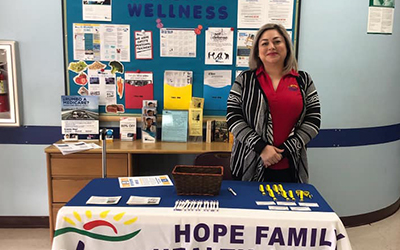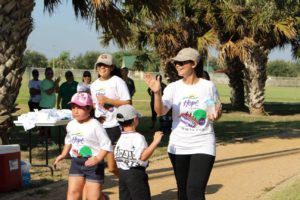
Peer Support in Integrated Health Settings Leads to Better Community Mental Health
Inside this story:
- Certified Peer Support Specialists share their lived experiences of mental illness and recovery to give others hope, support and tools for their own mental health journeys.
- Although more than 1,500 Peer Support Specialists have been certified in Texas, a general lack of understanding around the qualifications and functions of peer support services in primary care settings can make it difficult for health centers to implement the model.
- Hope Family Health Center (HOPE) was one of three community health centers to receive funding in 2015 through the Hogg Foundation’s Advancing Peer Support in Integrated Health Care grant program.
- Grantees use an integrated health care approach to incorporate Certified Peer Support Specialists into their broader ecosystem of health care and mental health supports, and thus into their communities and the Texas mental health workforce at large.
Texans Without Health Insurance
In 2015, Elsa Roman was suffering from severe depression and urgently seeking help. Like more than 4.5 million fellow Texans, she didn’t have health insurance—a barrier that prevents many people from accessing health care and clinical services that address both their physical and mental health conditions.
When a friend told Elsa she might find solace in laughter yoga, her subsequent search for a session led her to Hope Family Health Center (HOPE). The McAllen-based primary care clinic and counseling center provides free services—laughter yoga among them—to medically uninsured residents of the Lower Rio Grande Valley in Texas.
Recalling the first time she walked through their doors, Elsa says, “I told myself, I know that place is going to help me.” After a couple months as a client, she regained her ability to hold a job and began volunteering at the clinic. Today, she serves as their Peer Support Specialist Coordinator.
Getting Support for Peer Support
The term “peer support,” according to Hogg Foundation grantee Via Hope, is “the act of people who have had similar experiences with mental health challenges giving each other encouragement, hope, assistance, guidance, and understanding that aids in recovery.” As a peer, Elsa’s style of caregiving is more flexible and less specialized than that of a traditional mental health provider. Rather than relying on schooling or expertise for credibility, Peer Support Specialists use lived experience and “day-to-day empathy,” in Elsa’s words, to reach the hearts and minds of clients.
The same year Elsa began her recovery journey, HOPE became one of three community health centers to receive funding through the Hogg Foundation’s Advancing Peer Support in Integrate Health Care grant program. The grantees, which include Project Vida Health Center (El Paso, Texas) and Gulf Coast Health Center (Port Arthur, Texas), used an integrated health care approach to incorporate certified Peer Support Specialists like Elsa into their broader ecosystem of mental health supports. Clients already receiving counseling and medical services at HOPE can now be referred to the Peer Support Department, where they gain access to peer support groups (known as “empowerment groups”) and one-on-one visits with peers.
“If you have a broken leg, you need a cane. Peer support is your cane. You might need surgery for your leg—that’s counseling.”
Peer support is an evidence-based practiced with a growing body of research behind it, and as of May 2018 all but five states have either established peer training and certification programs or are in the process of doing so. Although the model has come a long way since 2001, when it earned state recognition for the first time, a need for greater clarity around the boundaries of the peer support role can make it difficult to implement and evaluate.
If an agency’s organizational culture isn’t already rooted in person- or recovery-centered principles, onboarding even one of Texas’ 1,500-plus Certified Peer Specialists will inevitably challenge—if not upend—the preexisting status quo.
Certified Peer Specialists in Texas
Not surprising, then, that Elsa’s arrival was initially greeted with some resistance from her clinic’s counseling team, who questioned the ethical implications of the arrangement. As Rebecca Stocker, Licensed Clinical Social Worker (LCSW) and HOPE executive director, points out, “There’s a lack of conversation about the role that a counselor can play and a peer can play together in one organization.”
Until that conversation becomes commonplace, extensive education and advocacy efforts—both in the workplace and in the community—are needed for patients, health care providers and local mental health authorities to understand and eventually embrace peer support services. To help accomplish this, HOPE devotes a significant amount of time and resources to organizing community events and investing in media advertising. Elsa translates all educational materials into Spanish, the primary language spoken by about 85 percent of HOPE clients.
Rebecca also cites the valuable contributions of consultant and advocate Anna H. Gray, whose Prosumers International peer support groups meet across the state. To stay abreast of developments in the peer world and maximize impact on the ground, Elsa and Rebecca travel to conferences and forums where best practices and new ideas are exchanged. Elsa speaks, she says, “wherever they give me the mic.”
“Educating the community on behavioral health sometimes makes people more aware of their need for support, and that need for support turns into using our services.”
Community Impact of Peer Support
In her empowerment groups, Elsa sometimes facilitates discussions about famous cultural and historical figures whose legacies are as daunting as they are inspiring. Turning the dialogue back on participants, she asks, “What’s the difference between those people and us?”
The question makes it clear that Elsa not only recognizes the validity of their position, but has also been there—and from time to time still finds herself returning to that place. Though Elsa can’t offer professional therapy, the empathetic voice of confidence she provides as a peer reinforces the possibility of recovery and does wonders for her clients’ self-esteem.
“Within peer support groups, people create their own emotional support groups. They start talking with each other, exchanging numbers, sharing rides, bringing food.”
Eventually, the sense of agency and belonging individuals discover through regularly attending meetings begins to surface elsewhere. In other words, Elsa says, “People stop coming to the groups because they go back to their lives.” Whether it’s reentering the workforce, securing stable housing or making vital social connections, helping participants find something to live and hope for is the ultimate goal.
Since implementing peer support services, HOPE has assisted community partner El Milagro Clinic in adopting their own version of the model and becoming part of the peer support network. A Methodist Healthcare Ministries Sí Texas grant, leveraged by the Hogg Foundation grant, made it possible for HOPE to officially become a fully integrated behavioral health clinic in 2018.
Today, Elsa’s role at HOPE continues to evolve in exciting ways. She runs the newly launched HOPE Peer Support Warmline, a toll-free, non-crisis line that helps her connect with and give emotional support to people all over the Rio Grande Valley community. The Warmline was funded through an Texas House Bill 13 grant using matching funds from their Hogg Foundation grant.
“I would like everyone to know that recovery is possible. During your life, you hear so many negative things—you’re worthless, you’re a failure. We need to retrain our brains to receive the good message.”
“HOPE has done a terrific job incorporating peer support. It’s shifting the health care organizational culture to a truly recovery-oriented, whole health approach,” says Hogg Foundation Program Officer Rick Ybarra. “The Si Texas grant and Texas House Bill 13 awards are a testament to their tremendous efforts. Peers provide an invaluable support to persons with mental health conditions and their recovery journey.”
RELATED CONTENT
Consumer Voice: Its Role in Diversity, Equity and Inclusion
The mental health consumer movement began with principles of self-definition and self-determination.
Reentry Peer Support: The Lifeline of Lived Experience
Peer specialists can be invaluable in helping clients navigate the barriers and pitfalls that come with community reentry.
Peer Support for Young Adults
Certifying the youth to provide peer support, enables young adults with mental health conditions to lead more successful lives.



